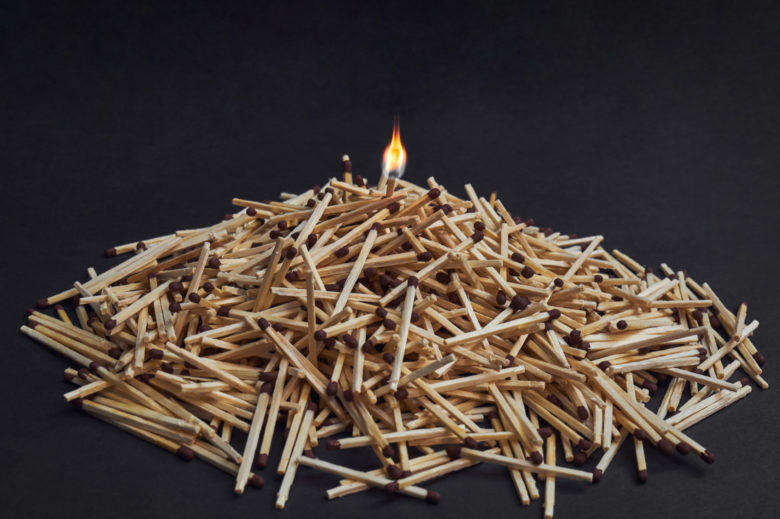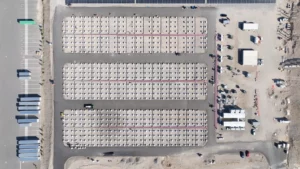Society, Economy And Government In Time Of Upcoming Crisis: Using Science And Technology To Predict And Deal With Chain Reactions

Stoyan Nedin is the founder of Nexpur, a company specialized in custom software development focused on the enterprise segment. He holds a Bachelor degree of Science degree in International Business and Management from the International Business School, Groningen, and an Executive MBA from the American University in Bulgaria. Nedin is keen on cognitive psychology, investing and behavioral economics.
We are in a situation where neither experience nor the common sense of the human brain can predict the global economic and social chain reaction from the virus and the measures against it. Our brain is just not equipped to predict a chess game 1000 steps ahead with 200 different participants. It’s time to use that scientific progress we have reached not for flashy BI & big data solutions deciding on the right shape of the next Coca-cola bottle but for urgent applications in crisis management, politics, and the economy.
It honestly amazes me that after quite a few weeks still some of the most developed countries in the world who spend billions on questionable military projects and IBM consultancy bills, haven’t applied enough science in their strategy and keep relying on opinions that don’t use big data simulations to calculate the effects and repercussions within the different spheres of society.
Having a huge lack of conscious experience with viruses, thankfully, apart from Zinc, hydration, and sleep I can’t give recommendations on safety measures regarding the chain of exponential infections. On the viral chain effect on the economy, though, I am pretty certain that today, in the middle of March, we can not imagine the collapses that may happen if we stay isolated for the next few months – not because of the illness itself but because of the chain reaction from the unseen global stop of: consumption, international trade, and payment of bills and expenses. Our generation is so used to the economy being hyperactive, even at its worst 2008, that we take it for granted that major companies, governments and industries simply have money to exist. We are like a fish that has never seen life without water, like a human that has never been in a world without oxygen.
On the simple side of predictions, if we don’t pay our suppliers and the government, they won’t pay the companies/people who at the end are our clients, who as a result won’t pay us. This chain reaction will quickly spread the non-payment mantra across every economic sector and participant and the only solution will be the government to pay salaries to everyone, including taxi drivers, restaurants, construction workers, b2b, etc., printing and distributing money like a newspaper boy in 1999, and we will be returning back to Backstreet Boys.
2008 was just an appetizer
Historically, even small drops in consumption in single countries like China or the US have lead to huge declines in multiple economies, affecting significantly the EU, Japan, South Korea, etc.. It’s hard to imagine what will happen when the whole world stops consuming at the same time. Just pumping money in the banks does not resolve the problem as there already were low-interest money & savings available and now the bigger problem is that there are much fewer ways to spend money today. If we want the wet-painted money to reach the people in need, the cash should be distributed on questionable terms to all large and small employers. Still, how long can such a welfare world sustain itself? Even the strongest currencies will be threatened, and I don’t want to imagine the inflation spirals that might hit weaker currencies.
The potential results of such a chain reaction could be unprecedented, resulting in companies not paying the state, their employees and suppliers down the chain until everyone is out of the market economy.
How the chain may look like:
First the Consumer-facing industries – transportation, tourism, restaurants, retail, leisure and entertainment, services like dentists, beauty, lawyers, consultants, brokers, etc.
↓
Industrial and manufacturing companies for consumer goods – cars, electronics, factories, Export industries, home&furniture, etc.
↓
Business services and productions – autoparts, IT, major consulting companies, materials, construction, chemicals, business equipment
↓
Energy & oil, Finance/Banks, Real estate, Stock market – The 2008 crisis may feel like a teenage summer swimming pool party
↓
Unemployment spreading in all the above sectors – in four months many people may be unable to pay rent and food unless there is mass-printed welfare
↓
Government has no income outside of printing as companies don’t pay VAT and social security, the state is unable to support and organize welfare, healthcare, pensions, law and order, a bit like what happened in Venezuela
↓
Crime, Social chaos, Dictators, Money printing & inflation
↓
Successful measures against global warming
How & why?
If we stay isolated for long and something close to the above domino gets triggered, most companies will soon be facing a choice between bankruptcy or massive layoffs and costs/salary cuts in attempts to survive another month, a taste of which we recently got in 2008, triggered just by some overvalued assets.
In a positive money printing scenario, we may end up in a quasi-communist state with no factories, with everyone relying on government salaries. If that’s not organized efficiently a significant percentage of people who live paycheck to paycheck will be without income – hundreds of millions of people unable to afford basic commodities in less than 6 months of isolation, relying mainly on printed welfare if they are lucky to qualify, while the government at its worst shape won’t have any income outside of the monetary policy, sitting with fingers crossed that the financial system doesn’t collapse.
Desperate people may go for desperate measures – gradually growing tolerance towards breaking laws, social distrust, rise of crime and heaven for organized crime creating their own rules, shortage of commodities and utilities, etc., – ‘Not good.’, as Trump would adequately elaborate. This will require a stronger government – police, military, healthcare, quick law enforcement – otherwise the mafia takes control. At least we will finally have a true but expensive test of all the libertarian theories and proudly say – ‘I told you!’.
It may be a kind of Paragraph 22 + Prisoners dilemma situation: You don’t have sources of money because you don’t spend money + choosing whether to pay your bills duly and risk having no money because everyone else is not paying, or keeping your money under the mattress, knowing that you produce the problem. In any case, it is hard to tell the public ‘Don’t Panic!!!’. Even throwing money on institutions, like the US and EU doesn’t seem to get the message across. If banks had good projects to lend to they would have lent the money already; it seems to me that mass welfare can be the only way, and only for a short term.
For example in Bulgaria perhaps we rightly took quick measures for social distancing, with nobel gestures from the government for some fee exemptions and extending deadlines on taxes, which feels great on the surface. It’s walking a thin line between spoiling the children with too much comfort vs. treating them too harsh and turning them into sociopaths. On one side, it’s important to let people breathe and not worry about paying their taxes, rent, and electricity. One the other side, if the governments start the wave of not-paying-expenses-culture during the pandemic, the collapse will be natural and imminent.
If not planning 10 steps ahead, such waves can trigger the worst chain reaction in the modern economy when the whole world postpones payments by 3-6 months, triggering the above-mentioned scenario. At this point, I am inclined to think that instead of 6+ months isolation of everyone, focusing on investing the printed money in serving and isolating only the vulnerable group for 3 months is going to be more effective, even with the price of stronger police/military measures supporting isolation. Such investments will create new jobs for millions who will be serving and isolating the endangered part of society, until most healthy people go through the virus, build herd immunity and the exponential spreading is cut.
Make a dream SWAT team
When we run a business project, we firstly put hard work in recruiting the right team. I think that if you run a whole economy, your first job should be to take maximum advantage of all resources and science to handle such a situation smartly by assembling an interdisciplinary and cohesive SWAT team consisting of at least:
- Data scientist/statisticians /mathematicians + Big data programmers
- Virologist + coronavirus expert.
- Modern meteorologist – because they are used to predict very long chains of complex cause and effect relationships and have tons of experience in programming and tuning the accuracy of their models successfully. *They might or might not look like the hot girl presenting the weather forecast on TV.
- Behavioral economist + Micro and Macro economist – to predict the spending and consumption patterns and tendencies + the economic effects of different measures.
- Psychologist – to predict individual behavior, compliance with social distancing, face touches, social behaviors, depression swings, crime tendencies, etc.
- PR – because social behavior has to be managed with the right messages.
- Captain Hero – a smart, powerful and benevolent leader who can allocate finance and execute the plan and take all the hate afterward.
- A priest – for the countries which are too late with the above experts. At least children will be safe.
These SWAT teams could program an interdisciplinary model calculating the chain reactions, similar to the weather forecast software. Computers, not human brains, should run the simulations with various scenarios, measures, and effects. Algorithms should be dynamically adapted with the development of new medicines, vaccines, economic developments and further understanding of the virus.
The quick wins
In any case, I believe it’s extremely important to keep money in circulation, transactions generating VAT and other taxes for the government, revenues for businesses, and not encourage people and businesses to postpone bills and expenses. The economy is like a human organism – it can’t postpone oxygen supply for too long.
In my opinion, to avoid the chain reaction, governments should lead by example and keep spending in existing and new ways and avoid any messages implying payments and projects are ‘on-hold’.
It will be key to not just encourage spending in the few ways we still have, like toilet paper, tuna cans and Netflix, but also to mobilize ourselves to be more entrepreneurial and adapt faster to implementing new non-physical business models that will appeal to consumers of the social distancing economy, which we need to stick with, in order to save the elders. For example, in our company, as a digital business, we still have the luxury to combine hard work and health measures, and are even launching a spin-off, but I don’t want to imagine what business model we would be implementing if we were a massage & SPA studio.
The sooner we invent alternative safe ways to keep trade and consumption going, the less the worst scenario will hit. Hopefully, medicines, vaccines or other measures can shorten the isolation period and printing money won’t go out of hand.
Questions for humans:
- How can I protect the more vulnerable people?
- How can I keep the economy going with less physical contact?
Question for the computer:
How to save the largest amount of people while triggering the least amount of economic chain meltdown? (Fed with interdisciplinary data produced by the SWAT team.)
Urgently, people in high power should rely not on common logic but rather on data science to guide their decisions throughout the best case simulations, if we want the negative scenarios to remain just on the screen. Meanwhile, let’s be inventive and keep the economy running in alternative ways – it needs us more than ever. In any case, the game has been restarted.






























